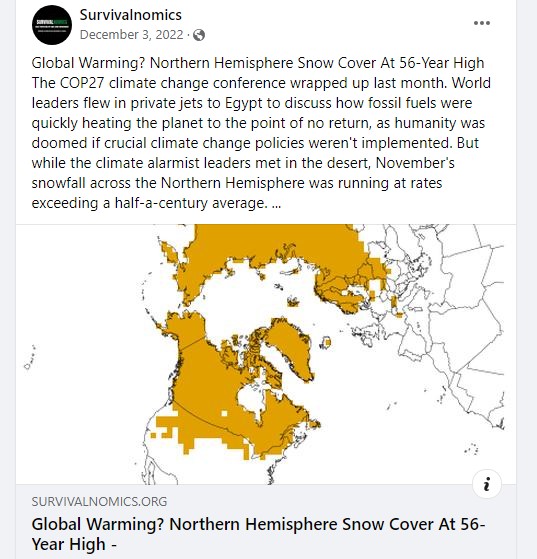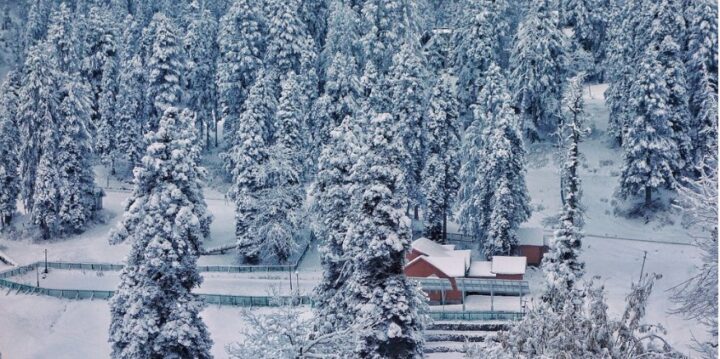A Facebook post has claimed that an increase in snow cover, recorded in the northern hemisphere in November 2022, is adequate evidence to negate climate change.
“Global Warming? Northern Hemisphere Snow Cover At 56-Year High,” reads the first line of the Facebook post, which goes on to conclude that in 2022, “November’s snowfall across the Northern Hemisphere was running at rates exceeding a half-a-century average”.

A similar post appeared on Zero Hedge website, with the headline, “Global Warming? Northern Hemisphere Snow Cover At 56-Year High”
Advertisement
The blog post on Zero Hedge used graphical illustrations from the Global Snow Lab and US National Oceanographic and Atmospheric Administration (NOAA), to indicate that the northern hemisphere snow reached about 41 million square kilometres in November, a 56-year high.
The histogram graph cited in the blog post actually compared the monthly reading of snow cover in the northern hemisphere since 1967. The analysis covered maximum and minimum values as well as the average.
However, does a one-month snow record reflect the trend for average snow extent, or is it sufficient evidence to discredit the global warming trend?
Advertisement
GLOBAL WARMING
The National Aeronautics and Space Administration (NASA), an independent US agency responsible for the civil space program and research, defines global warming as the long-term heating of the earth’s surface since the pre-industrial period (between 1850 and 1900) due to human activities.
NASA explains that the primary human activity responsible for global warming is the burning of fossil fuel which increases heat-trapping greenhouse gas levels in the atmosphere.
In a 2021 report, the United Nations Intergovernmental Panel on Climate Change (IPCC) said: “It is unequivocal that human influence has warmed the atmosphere, ocean and land.” This again negates the claim that seeks to trivialise global warming.
Advertisement
ONE MONTH’S DATA IS INSUFFICIENT TO INVALIDATE GLOBAL WARMING
A 2015 article published by a group of scientists, refutes the argument that cold weather negates the reality of climate change.
“Even though the planet overall is getting warmer, snow and cold weather still occur, particularly at high elevations and latitudes. But that doesn’t disprove global warming.
“To understand this, it’s helpful to differentiate between weather — what’s happening outside the door right now — and climate, which is the pattern of weather measured over a period of decades,” the article reads.
Advertisement
This shows that linking a map or graph showing an increase or decline in temperature in a particular month is insufficient to properly analyse climate.
Climate experts say that reaching a sound conclusion on climate analysis would require several years or decades of data.
Advertisement
David Robinson, a professor of physical geography and climatology, pointed out that later in November 2022, recent data show snow extent in the northern hemisphere had dropped below the level recorded earlier in the same month.
“Mid-November snow cover extent was well above normal across northern hemisphere lands. However, as November ends, that is not the case.
Advertisement
“For instance, there has been major melting of the earlier snowpack across much of North America such that extent for late November has fallen below normal.”
Researchers have established that weather and other variabilities in the climate are responsible for short-term deviations from time to time. A snowy or hotter month or year might not necessarily imply that climate change is not happening, or contradict a trend in global warming.
Advertisement
VERDICT
The claim which seeks to question the reality of global warming, citing the snow cover record in the northern hemisphere in November 2022 is misleading.
Climatologists say that a single month’s measurement does not disprove global warming. Trends require a broad spectrum of data and not just data from a particular month to adequately analyse climate change.
This fact check was produced by TheCable with support from Code for Africa’s PesaCheck, International Fact-Checking Network, and African Fact Checking Alliance network.
Add a comment







